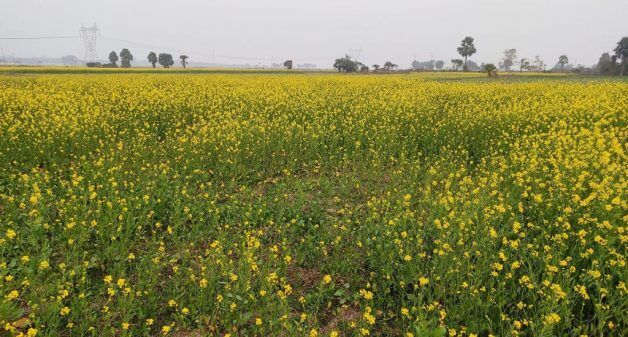
Big money in small mustards
Around 3,000 farmers and migrant returnees in Majuli – Assam’s flood-ravaged and eroding river island – reap rewards from growing climate resilient mustard.

Around 3,000 farmers and migrant returnees in Majuli – Assam’s flood-ravaged and eroding river island – reap rewards from growing climate resilient mustard.
A sea of yellow greets those who visit Majuli, the island in the middle of the Brahmaputra River in Assam’s hinterlands. Hundreds of acres of mustard crops are in full bloom.
The dazzling yellow fields are not just beautiful but profitable – a bright lifeline for many who used to flee the island in search of jobs elsewhere.
Debajit Kutum is a 28-year-old who left Assam to work in an oxygen plant in Kerala. He is one of the many Majuli youth who had gone to other states for jobs but were forced to return during the lockdown.
“The pandemic has been a blessing in disguise for us as we had ignored mustard for years and looked for greener pastures outside Majuli. But what’s the use of leaving our families and earning in a distant land when this crop can give us decent income?” said Kutum.
Seeds of hope
Thanks to a government scheme, hundreds of farmers are given climate-resilient mustard seeds.
“Around 5 to 6 months a year the island suffers from floods that wash away vegetable crops. Similar to the flood resilient paddy that farmers grow, we’ve given mustard seeds suitable for a changing climate,” said Irshad Ali, the sub-divisional agricultural officer at Majuli.

Around 3,400 farmers, including 1,200, women are now involved in mustard farming in Majuli, according to the district agriculture department. The farmers get a premium price from the many oil mills cropping up on the island.
Around 9,000 hectares of land is under mustard farming and the production is about 30 quintals per hectare.
The crop has offered the island – which has been battered by increasingly bad floods and soil erosion – a ray of hope.
The shrinking island
Majuli is the largest river island in the world with an area of around 553 square kilometres and a population of around 400,000 people. The island attracts tourists from across the world because of its natural beauty and 500-year-old Vaishnavite monasteries.
But the River Brahmaputra – also known as the “sorrow of Assam” – has devoured half of Majuli in the past five decades, leaving thousands of people homeless and forcing them to migrate to distant lands for livelihood.

Kutum is one of about 50 young men who have returned to Majuli and have already turned around 100 acres of their unused ancestral land into mustard fields.
Each contributed a small amount from his savings and bought farm machineries to convert the barren land for mustard farming. They will harvest the crop in February and expect a good profit.
“We expect to collectively earn Rs 40-45 lakhs by selling the produce and have already got orders from the oil mills. There are 25 mustard oil mills here,” said Kutum.
Most of the youth have decided to stay in Majuli now – permanently – and live off farming.
“We can also grow other crops, like paddy and vegetables, for home consumption during the rest of the year,” said Kutum.
Spreading the word
Hemant Sharma has long known of the profitability of growing mustard and has never considered migrating from the island in search of livelihood.
“I have around 8 bighas of land where I grow mustard and the income is enough to run my family. The crop requires less labour and water,” said the 40-year-old.
“Winter is perfect for mustard cultivation. We also train farmers to grow better quality crops and also save water and manpower. They get more profit because of this cost reduction. So now locals are interested in growing mustard,” said Ali.

Jito Moni Devi knows this well.
The 39-year-old lost her husband to cancer last year during the pandemic-induced lockdown. He passed away within a few months of his diagnosis and she somehow managed to perform his last rites amidst her grief.
The widow, who stays in remote Mohkina village in Majuli district, found herself at the crossroads after his death.
Growing mustard helped her navigate the difficult phase of her life.
“I used to help my husband in the farm after finishing the household chores. With his sudden death I became the bread winner and had the responsibility of bringing up my two minor children – a son and a daughter,” she said, her voice choking with emotion.
But Devi considers herself lucky as she lives in the interior of the island away from the wrath of the river.
“I decided to grow mustard as it is a cash crop and has higher returns. I got 16 quintals of mustard from four bighas and sold it at Rs 4,000 per quintal to the oil mills in the island,” said Devi.
Gurvinder Singh is a journalist based in Kolkata.